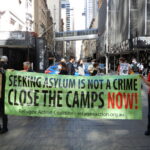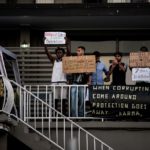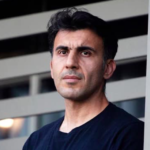Giving Voice to Migrants and Refugees: An Interview With IMA’s Professor Bruno Di Biase
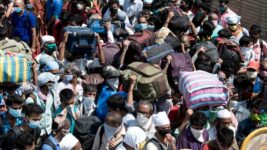
The start of the COVID-19 pandemic saw the entire nation of Australia go into lockdown. However, when 500 Victoria police officers were deployed to enforce a hard lockdown at nine public housing towers in North Melbourne and Flemington, it was this incident was being treated differently.
The 3,000-odd residents were confined to their flats with no prior warning and with no reasonable excuses to leave. This deployment of one officer for every six residents to enforce restrictions the rest of the community had never faced was due to cases being detected in some of the towers.
And the reason for the different approach taken in July 2020 was well understood: the residents in these buildings were largely poor migrants and refugees.
Indeed, this difference in pandemic response to migrant and refugee communities was a common theme across the globe.
Singapore had been heralded as having the gold standard in pandemic approached early on, until cases began rising amongst migrant worker communities, whom the government had simply forgotten to consider when dealing with the virus.
And it’s due to ongoing disparities like these that the Australian chapter of the International Migrant Alliance (IMA) has just launched.
Strength in organising
Around 386,000 migrant domestic workers live in Hong Kong with families who employ them. Just over half of these women are from the Philippines and the next biggest cohort is from Indonesia.
These workers are known to gather together in parks on Sundays, which is their only day off.
And it was due to these women organising together to provide a united voice to their grievances that the International Migrant Alliance was established in 2008.
Today, IMA is an international organisation of migrants, refugees and displaced peoples aligning with the common aim of upholding their rights in countries of migration, where they often remain hidden.
In early 2014, IMA organised mass migrant domestic worker protests in Hong Kong, as they called on the government for greater rights protections. These demonstrations came just months after a local couple had been sent to prison over having tortured their live-in worker.
Key organiser at these events was IMA Global chair Eni Lestari, who’s an Indonesian domestic worker living in Hong Kong. And her rights activism was sparked due to her firsthand experience of working for abusive employers in the East Asian business capital.
While in early 2020, IMA voiced worker concerns after the HK Labor Department called on domestic workers to stay at home during their day off due to COVID, as employers had been threatening to terminate workers who continued to insist on taking their rostered day off.
Guests ill welcomed
In Australia, the exploitation of migrant workers is on the rise. This is due to “guest worker” policies that limit their bargaining power in terms of wages and conditions. Yet, in the 1970s to the mid-90s, policies had been in place that ensured foreign workers enjoyed the same rights as locals.
And it’s against this backdrop that the Australian chapter of the International Migrant Alliance launched on 18 December, with Western Sydney Linguistics Associate Professor Bruno Di Biase announced as the head of the local organisation.
Sydney Criminal Lawyers spoke to IMA Australia chair Bruno Di Biase about the impact that the pandemic has been having upon migrant populations, the issue of forced migration, and how a united voice empowers those who are often silenced.
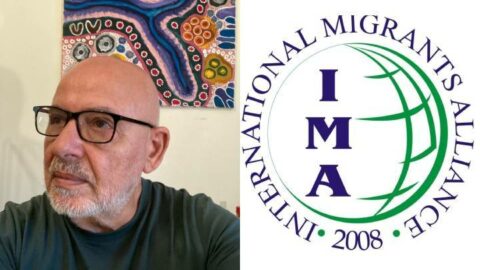
The local chapter of the International Migrants Alliance launched on 18 December, as part of the broader IMA Global association of migrants, refugees and displaced people.
The theme of the event was “march towards a world without forced migration”.
Professor Di Biase, can you talk a little on the significance of the theme of forced migration?
Forced migration is due to situations of war and extreme economic hardship. This essentially forces people to look for a better situation.
Our march towards a world without forced migration is a group campaign that advocates for a society where there are no wars.
It’s kind of ideal – almost utopian, if you like. There should be no war and economic crises that displace masses of people and force them to leave everything behind.
Nobody likes leaving their own native land. Often, they have to leave their family behind.
What this means is nations need to try and tackle the economic reasons why people are forced to leave.
IMA aims to unite migrants and refugees in this country as a means of upholding their rights. What are some unique features in the Australian setting?
There are Australian policies that are very discriminatory and disadvantage migrants and refugees.
The worst one, of course, is the policy of detention of so-called illegal migrants or refugees requesting asylum. This is a human rights issue.
The human rights of these people are denied, because they have nowhere else to go.
There are migrant workers who are allowed to help the Australian economy. Then what happens is the government does not provide them with Medicare, but they still have to pay tax like permanent residents.
These migrant workers even have to pay an education tax for their children to go to government schools. That would be okay if they were going to private schools, but they still have to pay for government schools.
Permanent residency visas are quite elusive. Workers need to be sponsored by employers. They’re in a situation where they have to be a “good girl” or a “good boy” towards the employer, to not claim their rights, and do that for a long time in order to obtain their sponsorship.
There needs to be a revision of all of these policies.
The Australian government has been condemned for its treatment of people arriving here after fleeing persecution in other countries. Can you speak a bit more on that issue?
The Australian government is spending millions to keep the detention centres here and overseas. It’s ridiculous, when these people could easily be accommodated.
There are multiple instances that show the Australian government is against refugees and asylum seekers.
The government wouldn’t even let them go to New Zealand, after the NZ government said they would take some asylum seekers in.
I find that amazing. Okay, if you’re unwilling to handle the problem, at least let somebody else do it. I find that really unconscionable.
And the asylum-seeking situation is likely to increase because of COVID. There are likely to be more and more people attempting to seek a solution to their hardships due to the pandemic.
IMA Global launched in 2008. How did it come about? And what’s it been achieving?
I’ve been to Hong Kong. And I’ve seen on a Sunday that there are thousands of migrant domestic help workers gathering together. That’s the only day they’re allowed out.
I didn’t realise before. I just saw thousands of people all congregating. I wondered what was happening. And I asked one woman, who told me that they meet on a Sunday because they all have free time.
So, that’s where it started, with the domestic migrant workers in Hong Kong. It started from the exploitation of some of these domestic workers by their employers. The workers began organising. They’re from the Philippines and Indonesia and so on.
So, IMA Global has been gaining a direct voice at the international level for people in these situations. It’s all about migrants in different nations joining together.
There are organisations at the international level that have been discussing the problems of migrants and refugees. But these people do not live with these problems.
The voices of the people who are actually suffering in these situations were missing. So, IMA was formed to give them a voice at the international level to raise migration issues, and also, to play a part in monitoring them.
We are advocating for the direct voice of migrants and refugees in the international discussion.
You mentioned COVID-19. Your local chapter has launched two years into a global pandemic. How has the onset of the virus uniquely affected the people that IMA represents?
It has affected them badly, both in the countries of origin and countries of migration.
In the countries of origin, COVID has deepened poverty and hardship, because the governments have failed, such as in the Philippines and Indonesia.
They have had great troubles in dealing with the pandemic, but so too, have economically advanced nations.
While over here, they’ve been left out of the safety net that was provided for everyone else.
This isn’t just the refugees and migrants – especially those on temporary visas – but it was also the international students, as they were left to their own devices with no help.
Would you say this experience of migrants and refugees being left out of the pandemic response has been common throughout developed nations?
Yes. It is common, just about everywhere. In a sense, one could understand it – not forgive it – in terms of governments having to deal with this problem for the first time.
They have tended to forget the poorer and more marginalised people in their societies.
You told those gathered at the recent IMA Australia launch that migrants and refugees should look at longer-term solutions to some of the adverse outcomes that neoliberal systems are having upon them.
So, what could some of these longer-term solutions look like?
Certainly, one would be to create an industry that would generate jobs for these people in the countries of migration.
Migrant workers should be provided with decent wages and contracts, as well as tax incentives for low-income earners.
Having to pay taxes when you are on a very low salary is incredible, especially when you see big corporations, such as Google, that don’t pay a cent in tax.
One important thing would be to rechannel military and warfare expenditure towards socioeconomic programs.
We know that Australia gives money to the Philippine Duterte government for its army. Why give it to the army? Why not fund some socioeconomic program that will help people not have to migrate? Similarly, with Indonesia.
The chief policies of corrupt governments are only beneficial to big business and the military, which helps to keep a lid on protest situations.
And lastly, Professor Di Biase, at the IMA Australia launch event, a three year general plan of action was deliberated upon. So, what’s next for your organisation in the local setting?
At the moment, we are very small. But we plan to consult with other organisations and government at the state and local level to explore creative avenues of how to support these communities.
We will also be approaching other migrant and refugee organisations to work together. We are not the only such organisation: there are churches and other civil society groups working in this space.
So, we will be providing a new voice for migrants and refugees in this country.


